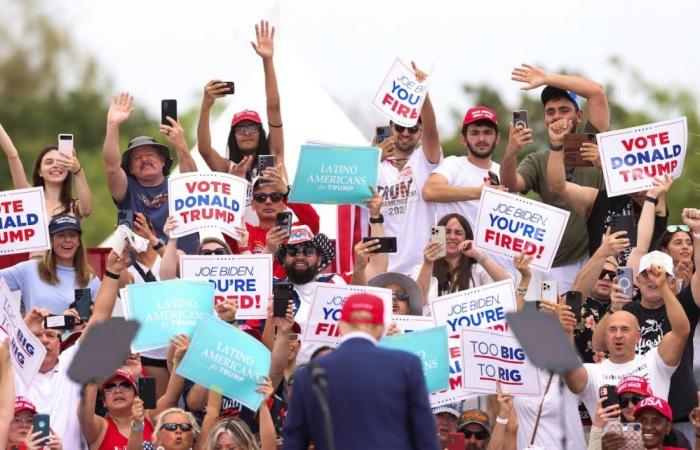Large American companies are in the process of attacking democracy, or so it seems. Stephen Schwarzman of Blackstone, the real estate investment and private equity conglomerate, is just the latest business leader to endorse Donald Trump’s bid for president. CEOs of major oil companies have done the same, and Jamie Dimon, chairman of JPMorgan Chase, recently observed that Trump’s views on NATO, immigration and many other critical issues are “pretty accurate.”
Much has changed since January 2021, when Trump supporters stormed the Capitol to prevent the certification of the 2020 presidential election. In the weeks after the insurrection, many companies solemnly promised not to fund candidates who denied that Joe Biden had won cleanly. But these commitments ended up being pure talk. The business world has never expressed a real fondness for democratic governance, of course. When it comes to its own operations, it prefers autocracy over self-government. Chief executives demand obedience from managers and workers, and shareholders, who are supposed to own the companies, are easily reassured with financial rewards. They rarely elicit the kind of collective action that would be needed to hold executives to account.
What makes these business leaders so powerful? The usual answer is that they control the company’s assets. This is what Karl Marx meant when he said that control of the means of production allows capitalists to obtain surplus value from labor. Since then, economic models have vindicated it, demonstrating that control of assets does indeed translate into control of the workforce.
But things are a little more complicated. After all, Schwarzman and Dimon don’t own their companies’ machines or the buildings that house the traders, investors or banking staff who work for them. They may own shares in their business empires, or options to buy more shares in their companies, but these holdings typically only represent a fraction of the total shares outstanding. And while shareholders, taken together, are often described as owners, equity does not give them control of the company’s operations or its assets. Rather, it confers a right to vote for board members, operate treasury stock, and receive dividends.
However, while CEOs rule as if they were the true owners, they do so through a power that is embodied in the legal tools they use to build their empires. They can depend on corporate and labor laws that privilege shareholders over workers, financial regulations that protect the stability of financial markets, and the generosity of central banks and taxpayers, who often bail out their companies when they fail. They have overreached.
These dependencies are rarely recognized, much less the crucial role that democracy plays in establishing the legitimacy and authority of the law. Business leaders are more comfortable making deals with themselves than submitting to collective self-governance, but they are also deeply dependent on the law and the political system that supports it.
By acting in self-interest, they are replicating the early history of state-building, which the late sociologist Charles Tilly compared to “organized crime.” In early modern Europe, political leaders stayed in power by regularly making deals with their friends, who then made more deals with clients they needed on their side. The rest of society served as foot soldiers: a resource that was exploited by the powerful to finance the maintenance of internal and external peace.
But therein lies the problem. Unlike agreements that are incorporated into law, these types of agreements are not enforceable. Nothing prevents a future president from breaking the promises he makes to business leaders during the campaign period, and Trump has made it abundantly clear that he has little patience for the law and the limitations it imposes on him as a business leader, president, or ordinary citizen. . This makes him a very unreliable business partner, and a clearly dangerous candidate for the presidency.
However, many business leaders are turning a blind eye to all this. They are betting on more empowerment, fewer taxes and lighter legal and regulatory restrictions. Some will try to cut deals to prevent Trump from getting back at them for any past disloyalty or slight. But what everyone will ultimately get is legal uncertainty—which is bad for business.
Let’s call it Hong Kong syndrome. When advocates of democracy and the rule of law took to the streets in Hong Kong to resist central control by the mainland Chinese government, most business leaders—and the heads of big law and accounting firms—remained silent. and then they accepted the security law that ended Hong Kong’s relative autonomy. They were supposedly more afraid of the people than of the Chinese state, and thus welcomed the restoration of order after the demonstrations were suppressed.
But this strategy has proven counterproductive. State control has become tighter not only against defenders of democracy, but also against companies. Companies have resorted to self-help, moving data centers to other jurisdictions, giving employees in Hong Kong single-use mobile phones and reducing their presence in a city that once stood out as a global market and hub. first-class financial
They did not understand that individual self-defense is more costly and less effective than collective self-defense. The latter demands a vibrant constitutional democracy in which the rule of law reflects a genuine commitment to robust self-government, rather than allowing big business to impose its will. By the time Schwarzman, Dimon and other American business titans discover the costs of attacking democracy by supporting Trump, it will be too late.
Follow all the information Economy and Business in Facebook and xor in our weekly newsletter






